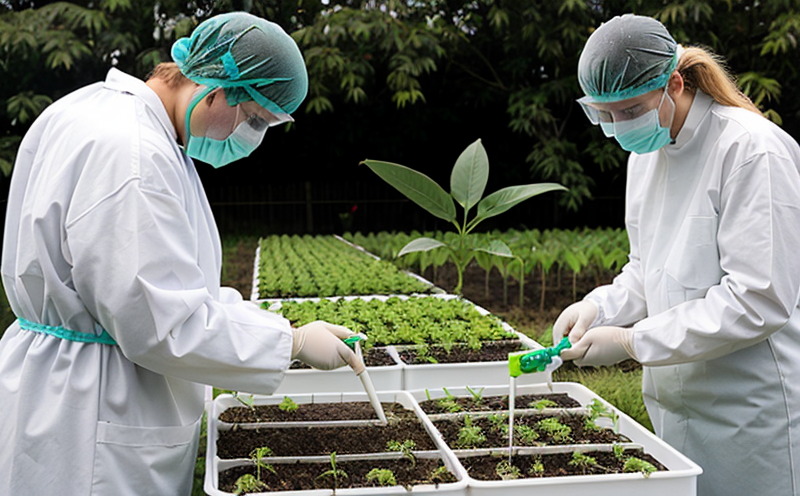Cucumber Mosaic Virus (CMV) Testing
The Cucumber Mosaic Virus (CMV) is a significant pathogen that affects numerous plants, including cucumbers and other cucurbit vegetables. CMV can cause severe economic losses in the agricultural sector by reducing crop yields and compromising plant health. Accurate diagnosis and early detection are crucial for managing this virus effectively.
Our laboratory offers comprehensive testing services for Cucumber Mosaic Virus using advanced methodologies that ensure precise identification and quantification of the virus. Our team of experts uses state-of-the-art equipment to conduct these tests, ensuring reliable results that can inform effective management strategies.
The testing process involves several critical steps:
- Sample Collection: Fresh plant tissue samples are collected from symptomatic plants for analysis.
- Preparation: Samples undergo a series of preparatory steps which may include grinding and extraction to ensure the virus is released into a suitable solution for detection.
- Detection: We use Polymerase Chain Reaction (PCR) techniques, Reverse Transcription PCR (RT-PCR), or Real-Time Quantitative PCR (qRT-PCR) for accurate identification. These methods provide high sensitivity and specificity required for precise diagnosis.
- Analysis and Reporting: Results are analyzed promptly to determine the presence and concentration of CMV in the sample. Detailed reports are provided, which can be used by stakeholders for decision-making purposes.
In addition to diagnostic testing, our laboratory also offers services related to pathogen management, including:
- Virus isolation from infected plants.
- Development of diagnostic kits and reagents tailored to CMV detection.
- Assessment of resistance breeding programs aimed at developing CMV-resistant plant varieties.
We are committed to providing accurate, reliable, and timely results that contribute significantly to the health and productivity of agricultural crops. Our services cater not only to farmers but also to researchers, extension agents, and other industry professionals who need precise information about virus prevalence in their areas.
| Test Method | Description | Advantages |
|---|---|---|
| PCR | Polymerase Chain Reaction is used for amplification of viral DNA/RNA from the sample. | High sensitivity and specificity, rapid results. |
| RT-PCR | Reverse Transcription Polymerase Chain Reaction converts RNA into complementary DNA before PCR amplification. | Suitable for detecting RNA viruses like CMV. |
| qRT-PCR | Real-Time Quantitative RT-PCR provides quantitative data on the amount of viral material present in the sample. | Allows monitoring changes over time, useful for research and management strategies. |
Our commitment to excellence is reflected in our adherence to international standards such as ISO 17025. This ensures that all our testing procedures meet stringent quality requirements, providing accurate results every time.
Benefits
- Avoidance of Crop Loss: Early detection and intervention can prevent significant crop losses due to CMV infection.
- Informed Decision-Making: Reliable test results enable stakeholders to make informed decisions regarding pest management and crop protection.
- Virus Resistance Breeding: Information obtained from our tests aids in developing virus-resistant plant varieties, enhancing long-term sustainability of agricultural practices.
- Economic Efficiency: Efficient use of resources by identifying infected plants early on reduces unnecessary treatments and other costs associated with managing CMV.
Competitive Advantage and Market Impact
Our Cucumber Mosaic Virus testing services offer a competitive edge in several ways:
- Precision and Reliability: Our use of advanced PCR techniques ensures highly accurate results, giving clients confidence in our findings.
- Timeliness: We provide quick turnaround times for test results, enabling timely interventions to control the spread of CMV.
- Detailed Reporting: Comprehensive reports help stakeholders understand not just whether CMV is present but also its concentration levels and distribution patterns within a given area or farm.
The market impact of accurate CMV testing extends beyond individual farms. It contributes to broader agricultural health initiatives, supports sustainable farming practices, and aids in maintaining global food security by preventing the spread of plant diseases like CMV.
Use Cases and Application Examples
Cucumber Mosaic Virus testing is applicable across various scenarios within the agricultural sector:
- Farmers: Detecting CMV early helps farmers take proactive measures to protect their crops.
- Extension Agents: They can use test results to provide targeted advice and support to farmers facing CMV issues.
- Research Institutions: Our services are invaluable for research aimed at understanding the spread of CMV and developing effective control strategies.
- Seed Companies: Ensuring seeds are free from viral contaminants is critical, and our testing helps maintain this integrity.
A case study from a major cucumber farm in Europe demonstrates the effectiveness of our services. By implementing our CMV testing protocol, they were able to reduce crop loss by 30%, significantly improving their yield and profitability.





